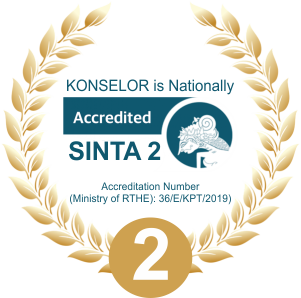Perbedaan Aspirasi Karier Siswa ditinjau dari Jenis Kelamin, Jurusan, dan Tingkat Pendidikan Orangtua serta Implikasinya terhadap Pelayanan Bimbingan dan Konseling
 ), A. Muri Yusuf(2), Mega Iswari(3),
), A. Muri Yusuf(2), Mega Iswari(3), (1) Universitas Negeri Padang
(2) Universitas Negeri Padang
(3) Universitas Negeri Padang
 Corresponding Author
Corresponding Author
Copyright (c) 2017 Konselor
DOI : https://doi.org/10.24036/02016536552-0-00
Full Text:
 Language : en
Language : en
Abstract
Career aspiration is an important for students, because needs to be done first when choosing one career is to have career aspiration. The fact in the field signified that the students do not have a career goal in the future. This is an indication that the students career aspiration are in the low category. The aim of this research was to: (1) describe students career aspiration is sighted of sex, majors, and parents educational level, (2) examined differences in students career aspiration of male and female, (3) examined differences in career aspiration of students majoring in science and social studies, (4) examined differences in students career aspiration is sighted of parents educational level, and (5) examined differences in students career aspiration is sighted of interaction of sex, majors, and parents educational level. The research methods applied in this research was ex post facto with factorial design 2 x 3 x 2. The population this research was consisted of 837 students in SMAN 7 Padang. The number of samples as much as 270 students were selected by propotional random sampling technique. The instrument of the research was career aspiration scale with reliability 0.885. Data were analyzed using descriptive statistics and analysis of variance. The result of the research indicated that: (1) In general, career aspiration of students is sighted of sex, majors, and parents educational level were in high category, (2) there is no significant differences between career aspiration of male and female students, (3) there is no significant difference between career aspiration of students majoring in science and social studies, (4) there was a significant difference between career aspiration of students having parents educational level of high, medium, and low, (5) there is no significant differences in students career aspiration is sighted of interaction of sex, majors, and parents educational level.
Keywords
References
Abadini, D. (2009). “Gambaran Fear of Success pada Wanita Etnis Minangkabau yang Bekerja di Jakarta”. Tesis tidak diterbitkan. Jakarta: Program Pascasarjana Psikologi Unika Atma Jaya.
Arpandy, G. A. (2010). “Gambaran Fear of Success pada Wirausaha Wanita Suku Banjar”. Tesis tidak diterbitkan. Jakarta: Program Pascasarjana Psikologi Unika Atma Jaya.
Domenico, D. M., & Jones, K. H. (2006). “Career Aspirations of Women in the 20th Century”. Journal of Career and Technical Education, 22 (2): 1-7.
Esters, L. T., & Bowen, B. E. (2005). “Factors Influencing Career Choices of Urban Argicultural Educations Students”. Journal of Argicultural Educations, 46 (2): 24-35.
Fischer, J. C. (1976). “Parents Career Aspiration for Their Children Enrolled in Bilingual Program”. Journal, 2 (1): 1-15.
Francis, B. (2002). “Is the Future Really Female? The Impact and Implications of Gender for 14-16 Year olds Career Choices”. Journal of Education and Work, 15 (1): 75-88.
Horrocks, J. E. (1976). The Psychology of Adolescence, Behavior and Development. Boston: Houghton Mifflin Company.
Hurlock, E. B. (1978). Perkembangan Anak (Edisi 6, Jilid 2). Terjemahan oleh Meitasari Tjandaras. Jakarta: Erlangga.
Isaacson, L. E. (1986). Career Information in Counseling and Teaching. Boston: Allyn and Bacon.
Lerdpornkulrat, T., Koul, R., & Sujivorakul, C. (2010). “Career Aspiration and The Influence of Parenting Styles”. Journal Education and Educational Technology, 5: 71-76.
Peraturan Menteri Pendidikan dan Kebudayaan Republik Indonesia Nomor 59 Tahun 2014 tentang Kurikulum 2013 Sekolah Menengah Atas/Madrasah Aliyah. Jakarta: Permendikbud.
Prasetyo, J. R. (2005). “A Study of Educational and Career Aspirations of Semarang Freshmen Universities Indonesia”. Disertasi diterbitkan. United States: University of Pittsburgh.
Prayitno, E. (2006). Psikologi Perkembangan Remaja. Padang: Angkasa Raya.
Puspitawati, H. (2013). Gender dan Keluarga: Konsep dan realita di indonesia. Bogor: IPB Press.
Robbins, S. P. (2003). Organizational Behaviour (Perilaku Organisasi) Edisi ke 10. Terjemahan oleh Benyamin Molan. Jakarta: Gramedia.
Triandis, H. C. (1994). Culture and Social Behavior. Amerika: McGraw-Hill.
Yusuf, A. M. (2002). Kiat Sukses dalam Karier. Padang: Ghalia Indonesia.
 Article Metrics
Article Metrics
 Abstract Views : 1691 times
Abstract Views : 1691 times
 PDF Downloaded : 672 times
PDF Downloaded : 672 times
Refbacks
- There are currently no refbacks.
Copyright (c) 2017 Konselor







